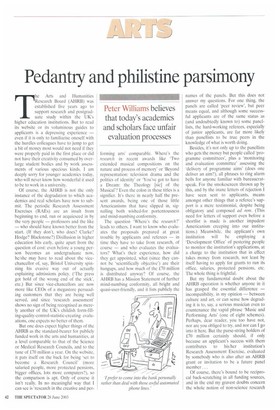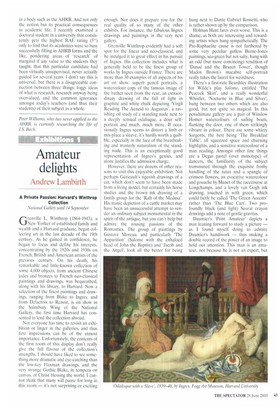Pedantry and philistine parsimony
Peter Williams believes that today's academics and scholars face unfair evaluation processes
r he Arts and Humanities
Research Board (AHRB) was established five years ago to
-f
support research and postgrad uate study within the UK's higher education institutions. But to read its website or its voluminous guides to applicants is a depressing experience — even if it is only to familiarise oneself with the hurdles colleagues have to jump to get a bit of money most would not need if they were properly paid in the first place or did not have their creativity consumed by overlarge student bodies and by work assessments of various specious kinds. I am deeply sorry for younger academics today, who will never know how wonderful it used to be to work in a university.
Of course, the AHRB is not the only instance of the degradation to which academics and real scholars have now to submit. The periodic Research Assessment Exercises (RAEs) are an insult from beginning to end, run or acquiesced in by the very people — professors and the like — who should have known better from the start. (If they don't, who does? Clarke? Hodge? Blackstone?) Disillusion in higher education hits early, quite apart from the question of cost: even before a young person becomes an undergraduate now, he/she may have to read about the vicechancellor of, say, Bristol University spinning his evasive way out of actually explaining admissions policy. (The press got hold of the wrong end of the stick', etc.) But since vice-chancellors are now more like CEOs of a megastore persuading customers that they are being well served, and since 'research assessment' shows no sign of being recognised as merely another of the UK's childish form-filling-quality-control-statistic-creating evaluations, one expects no better of them.
But one does expect higher things of the AHRB as the standard-bearer for publicly funded work in the arts and humanities, at a level comparable to that of the Science or Medical Research Councils, and to the tune of £70 million a year. On the website, it pats itself on the back for being 'set to become a Research Council' (more salaried people, more protected pensions, bigger offices, lots more computers?), so the comparison is apt. Only of course it isn't really. In no meaningful way that I can see is 'research in the creative and per forming arts' comparable. Where's the research in recent awards like 'Two extended musical compositions on the nature and process of memory' or 'Beyond representation: television drama and the politics of identity' or 'You've got to have a Dream: the Theology [sic] of the Musical'? Even the colon in these titles is a signifier. It's there in nearly half the present awards, being one of those little Americanisms that have slipped in, signalling both wished-for portentousness and mind-numbing conformity.
The question 'Where's the research?' leads to others. I want to know who evaluates the proposals prepared at great trouble by applicants and referees — in time they have to take from research, of course — and who evaluates the evaluators? What's their experience, how did they get appointed. what (since they cannot be 'scientifically objective') are their hangups, and how much of the £70 million is distributed anyway? Of course, the AHRB has a Mission Statement of further mind-numbing conformity, all bright and quasi-user-friendly, and it lists publicly the
names of the panels. But this does not answer my questions. For one thing, the panels are called 'peer review', but peer means equal, and although some successful applicants are of the same status as (and undoubtedly known to) some panellists, the hard-working referees, especially of junior applicants, are far more likely than panellists to be true peers in the knowledge of what is worth doing.
Besides, it's not only up to the panellists who gets the money but people called 'programme committees', plus a 'monitoring and evaluation committee' assessing the 'delivery of programme aims' (does one deliver an aim?), all phrases to ring alarm bells for anyone familiar with bureaucratspeak. For the smokescreen thrown up by this, and by the inane letters of rejection I have seen sent to applicants, means amongst other things that a referee's support is a mere testimonial, despite being obligatory and composed ad rem. (This need for letters of support even before a shortlist is made is another impudent Americanism creeping into our institutions.) Meanwhile, the applicant's own institution will be employing a 'Development Office' of pestering people to monitor the institution's applications, at a charge to the institution that in effect takes money from research, not least by itself having to apply for grants to run its office, salaries, protected pensions, etc. The whole thing is frightful.
But my fundamental doubt about the AHRB operation is whether anyone in it has grasped the essential difference — incompatibility, in my opinion — between culture and art, or can sense how degrading it is to, say, a serious musician even to countenance the vapid phrase 'Music and Performing Arts' (one of eight schemes). Perhaps, dear reader, you too have not, nor are you obliged to try, and nor can I go into it here. But the purse-string holders of £70 million certainly should, if only because an applicant's success with them contributes to his/her institution's Research Assessment Exercise, evaluated by somebody who is also after an AHRB grant or invitation to be a future panel member ...
Of course, there's bound to be reciprocal back-scratching in all funding sources, and in the end my gravest doubts concern the whole notion of non-science research in a body such as the AHRB. And not only the notion but its practical consequences in academic life. I recently examined a doctoral student in a university that consistently gets the highest RAF rating (5) only to find that its academics were so busy successfully filling in AHRB forms and the like, pondering areas of 'research' of marginal if any value to the students they taught, that this particular candidate had been virtually unsupervised, never actually guided for several years. I don't say this is universal, but there is a disagreeable connection between three things: foggy ideas of what is research, research anyway being overvalued, and the common ignorance amongst today's teachers (and thus their students) of their subject as a whole.
Peter Williams, who has never applied to the AHRB, is currently researching the life of ,I.S. Bach,



































































 Previous page
Previous page